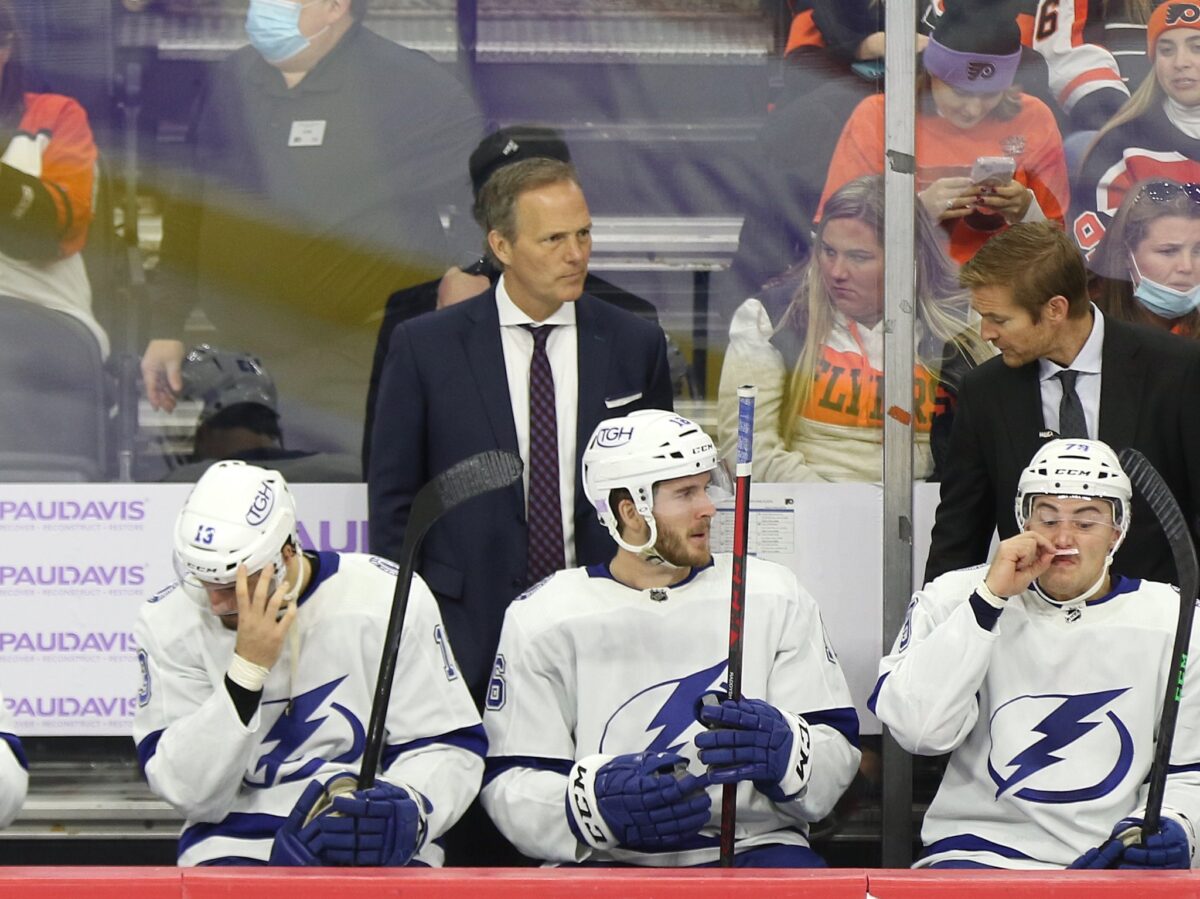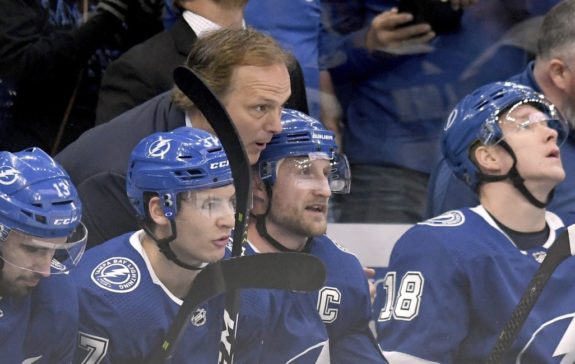Somebody once said that coaches get too much praise when their teams perform well, but too much criticism when things aren’t going well. However, in the case of Tampa Bay Lightning head coach Jon Cooper, he may not be getting enough recognition for the success of this team.
This assumption is mostly based on the fact that Cooper has once again been passed over to be nominated for the Jack Adams Award, given to the NHL’s coach of the year. The award is presented annually “to the coach adjudged to have contributed the most to his team’s success.” Voting is done by the members of the NHL Broadcasters’ Association.
This is not to suggest that any of this year’s three finalists are not deserving of the award. Calgary’s Darryl Sutter, the Rangers’ Gerard Gallant, and Florida’s Andrew Burnette have all led their teams to seasons that exceeded expectations. But for a coach who has done what Cooper has for as long as he has, two nominations seem a bit on the light side, especially for a coach with the longest tenure in the league.
Longevity Matters
While the Adams Award is an annual award, a coach that consistently leads his team to successful seasons should at some point be rewarded. NHL coaches rank third in average tenure among head coaches, being only slightly ahead of the NBA. So shouldn’t a coach that is successful well above his peers be recognized? Cooper has won wherever he has coached and has a solid track record with the Lightning during his nine seasons with the team. There could be an argument that while the Lightning only finished third in their division, Cooper may have coached this team as well as any. Especially after they have gone through a couple of long and pandemic challenging playoffs in winning two Stanley Cups.

Cooper was named the ninth head coach in Lightning franchise history on March 25, 2013. He made his NHL coaching debut at AMALIE Arena on March 29, 2013, in a 5-4 shootout victory against the New Jersey Devils. He joined the Lightning after spending three seasons behind the bench of Tampa Bay’s top minor league affiliates, the Norfolk Admirals (2010-12) and the Syracuse Crunch (2012-13), compiling a 133-62-26 (.661) record in 221 American Hockey League (AHL) games. He won the Calder Cup with Norfolk in 2012, a season that included 28 straight wins. He currently has a record of 434-220-61 (.671) in the regular season and a 78-49 (.727) record in the playoffs.
With Cooper, It’s Mostly About the Locker Room
Much of Cooper’s approach is about getting the best from his talent. One of the things his players appreciate about their coach is that he does not criticize them in public. Something that even has more weight during a time when negative remarks can go viral on social media very quickly. The most recent example of this came in the previous playoff series against the Toronto Maple Leafs. Pat Maroon was struggling at the beginning of the series, which included taking a very unnecessary penalty in Game 3. Cooper and Maroon had a one-on-one meeting to “discuss” his play, but the details of that conversation never left the room. When Cooper does offer criticism in the media, it is very team-focused, using terms like “we” and “they” when answering questions. Players like that and they respond to it in a positive way on the ice.

Cooper is also a coach who does not hold a grudge. He does not really have a public “dog house” like other coaches seem to have. When he does have issues, he addresses them. One noticeable incident happened in 2017 with forward Jonathan Drouin, who was upset with the way he was being handled by the Lightning. His agent then requested a trade and stated that Drouin would never play for the Lightning again. A few months went by and Cooper successfully repaired the relationship by sitting down and having an honest and forthright conversation over breakfast, with Cooper admitting the mistakes he had made. The two sides were able to mend fences, leading Drouin to be one of the more successful players for the team in the playoffs that season.
This is exactly what general manager Julien Brisbois had in mind when he first hired Cooper for the job in Norfolk. “We needed someone who had leadership and good communication skills, someone who was a teacher and someone who builds good relationships with his players over and above the traditional player-coach relationship.”
Cooper Also Excels With “Xs and Os”
One of the drawbacks of having good teams is that sometimes the perception is that the coach wins only because he has the best players and that the only thing that Cooper does as a coach is to toss the pucks out on the ice for practice and roll out some lines during a game. In fact, nothing could be further from the truth. One of his coaching philosophies emphasizes taking care of the defensive end of the ice first. This was very evident in the recent sweep of the Florida Panthers, holding the highest-scoring team in the league to just three goals for the entire series. While Andrei Vasilevskiy was outstanding in goal, Cooper inspired his team to give up their bodies to block shots, totaling 77 in all for the four games.

Cooper also excels with his in-game management. For the argument that he has so much talent that he just throws out player lines at will, consider the fact that the Lightning likes to dress 11 forwards and seven defensemen for games. This means that Cooper and his staff mix and match lines as the odd number does not allow him to roll out the same four lines. He has to consider the positions as well as make sure that certain players are not on the ice too much. Not an easy task to balance all of these considerations. When the opponent does something different in a game, he makes his adjustments quickly and efficiently. When the Panthers finally broke their long 0-for-25 playoff power-play slump, they made some small adjustments to their strategy. Cooper countered, and the Panthers did not get another power-play goal for the rest of that game or the series.
Related: Lightning’s Shot Blockers are the Unsung Heroes in Pursuit of a 3-Peat
Cooper and the Lightning are probably way more concerned with adding Stanley Cups instead of personal awards. However, if individual awards are going to be given out, there should be consideration given to those who consistently perform well over a long period of time and be acknowledged for those accomplishments.